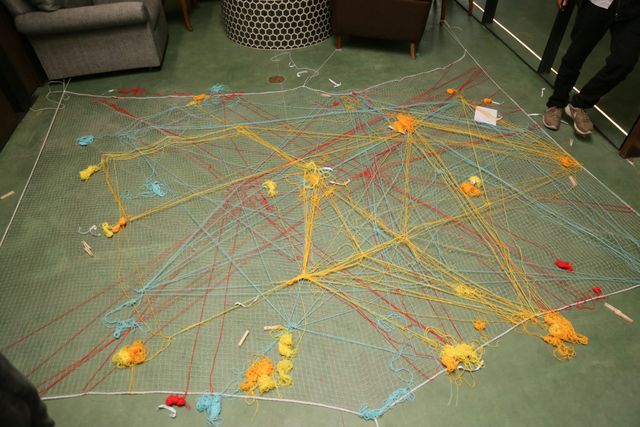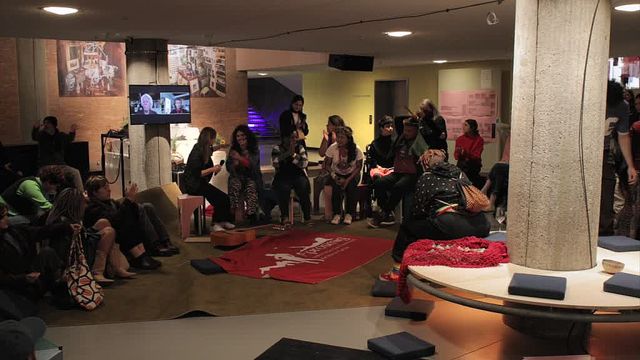Lectures and performances
#Commonings: Day 1
In English

What could a school look like that seeks to make both learning and unlearning a common interrelated practice? How can a space be built around care, refuge, implication and vulnerability, negotiating positions and responsibilities?
How can (un)learners in this space challenge privileges and habits of hierarchy, as well as authorship, productivity and competition?
More information and program overview
4 pm
Exhibition Opening
5–5.30 pm
Welcome Words in the Assembly, Hirschfeld Bar
with Olga Schubert, Gigi Argyropoulou, Alessandra Pomarico, Mahmoud Al-Shaer and Rahul Gudipudi
5.30–6 pm
Opening Ritual in the Assembly, Hirschfeld Bar
with melke~ta’wa, Maria Aparecida and Vandria Garcia Borari and Paulo Borari
resonate the struggle of the forest and
of the Peoples of the ancestral forests
resounding stories-strategies that are alternatives
to the exploitation of bodies-earth-territories
of the amazon, of the atlantic forest and beyond
in counterflow to the abuse
of the impoverished people’s lives
in the compulsory financialization of existence:
care for the earth, care for life on earth
guided by indigenous constellations
and by the dark night of the whores ~
6–7.30 pm
Enclosures, Development and the Many-Headed Hydra
Feminist and Indigenous Resistance in Defense of Life, Territories and the Commons
Conversation in the Assembly, Hirschfeld Bar
With Peter Linebaugh, Silvia Federici, Vandria Garcia Borari, Paulo Borari and melke~ta’wa, moderated by Alessandra Pomarico
In English
Peter Linebaugh and Silvia Federici will discuss how historically as well as in contemporary times the Commons are under attack by the State, Capital and Empire, and how feminism, Indigenous resurgence and the politics of the commons come to support regenerative ways of living, alternative to capitalism, violence and dispossession.
In addition, Vandria Borari and Paulo Borari together with melke~ta’wa will bring their experiences of how extractivism, land grabbing and sexual exploitation affects the lives and their territories in Brazil, and how their resistance is organized.
8–11 pm
Clairvoyance as scientific spirituality
Sessions in conference room 2
In English, French, German or Spanish
In 15-minute time slots, visitors are invited to ask the clairvoyant Ingrid Müller-Farny a question about their own past, present or future, or to inquire about deceased persons. The questions can be asked in English, French, German or Spanish.
8.30–9 pm
Ritual in the Main lobby
Maroon March Ritual
with Ivonne González Núñez and Paulina Marquez
This ritual will serve as a protection against danger, external attacks, kidnapping and appropriation attempts. Paulina Marquez and Ivonne González will offer a ritual for maroon walkers that for this occasion will be dedicated to the Fugitive Library and those who inhabit it. Ivonne and Paulina aim to celebrate the road undertaken, what the land and their ancestors give them and the iron will to preserve and enrich what is given in order to continue on this road.
9–9.30 pm
Transatlantic Sounds: Are you listening to ...?
A Sound Lecture and Performance in the Assembly, Hirschfeld Bar
By Transatlantic Sounds: Ana Bravo Pérez, Jorge Gómez and Tomás Espinosa, in collaboration with the Pilón Cultural Association and Juan Orozco
What happens when violence, poverty, historical plunder, discrimination, colonial traces, colonialism and the concept of the global South become agenda items to check off, vague notions of diversity and are no longer understood as complex and difficult realities? Isn´t “bottling” this knowledge, without concern for the people and leaving holes in their existence, also a form of extractivism? (Fannie Sosa)
The curatorial concepts in museums and cultural institutions can be a smoke screen behind which a lived reality exists. A reality that can only be known by those who experience it. For this lecture performance, the performers will reflect on what amplification and listening means for the sharing of knowledge and the muted voices that are excluded from this conversation. Who is listening to whom? The wish is to unlearn in order to learn, but unlearn and learn what? A vague discourse of inclusion and critical postures? How can unlearning take place to share knowledge oriented towards reparation and finding each other?
Through this lecture performance, the audience is encouraged to listen to non-Eurocentric stories and to reflect on colonial ways of knowledge and power structures.
